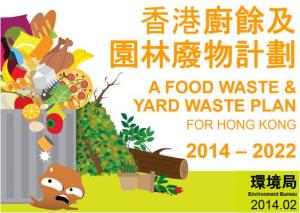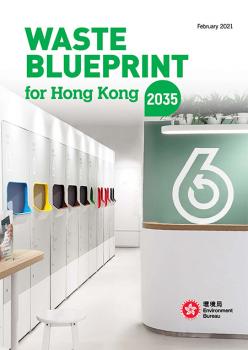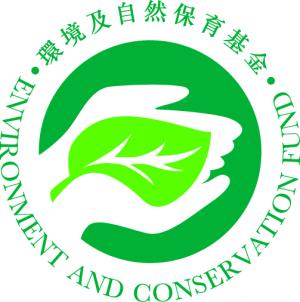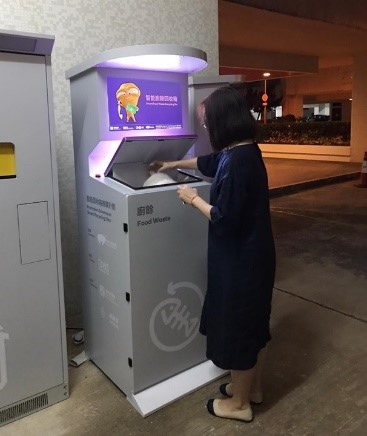Current Status
At present, most of Hong Kong’s food waste is disposed of at landfills together with other municipal solid waste (MSW). In 2022, there were some 11,130 tonnes of MSW disposed of at landfills each day. Of these, about 3,300 tonnes (30%) were food waste, constituting the largest MSW category. Among the food waste disposed of at landfills daily, some 1,000 tonnes were generated from commercial and industrial (C&I) sources such as restaurants, hotels, wet markets, food production and processing industries.
The current practice of disposing of biodegradable food waste at landfills is not sustainable and is environmentally undesirable as it depletes the limited landfill space, creates odour nuisance, generates leachate and landfill gases that require further mitigation measures to deal with, and squanders the useful organic contents.
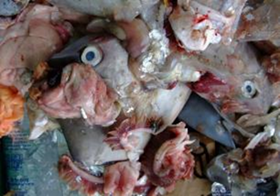
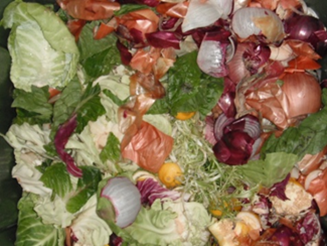
To tackle the challenge of food waste in Hong Kong, the Government issued "A Food Waste and Yard Waste Plan for Hong Kong 2014-2022'' (''Food Waste Plan'') and ''Waste Blueprint for Hong Kong 2035'' (''Blueprint'') to map out the strategies for food waste management.
Food Waste Management Strategy
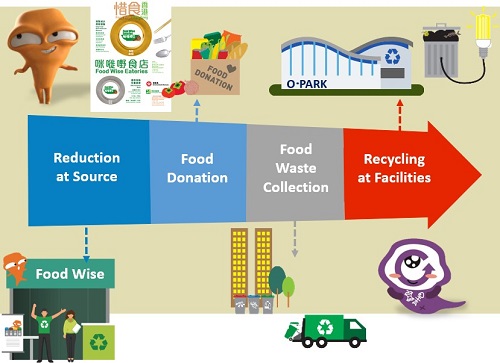
Reduction at Source
The most important step in reducing food waste is to avoid creating it in the first place. Food Wise Hong Kong Campaign promotes a food wise and waste less culture through various schemes and activities, e.g. Food Wise Charter, Food Wise Eateries Scheme, publicity of the Big Waster, etc.

Food Donation
The Campaign also promotes food donation from those commercial establishments with surplus food to charitable organisations. Through the Environment and Conservation Fund (ECF), the EPD has been supporting non-governmental organisations in running food recovery projects, under which surplus food is collected from the commercial sector and donated to the needy to achieve the goal of caring for society and reducing food waste.

Food Waste Collection
Inevitable food waste should be source-separated and recycled to gainful resources.
Pilot Scheme on Food Waste Collection
The EPD launched a larger scale Pilot Scheme on food waste collection in 2021, focusing on food waste generated from the private (commercial and industrial sector) and public premises. Source-separated food waste collected under the Pilot Scheme will be transformed into energy, and compost as a by-product at O·PARK1.
For any premises interested in the Pilot Scheme, please contact the EPD by email fwc@epd.gov.hk for more details.
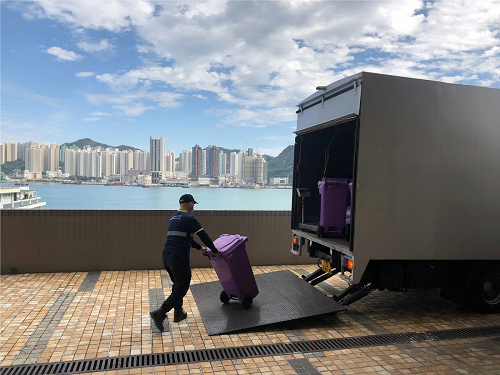
Food Waste Collection Service
Information on Food Waste Source Separation and Collection
- Pilot Scheme Overview [For domestic food waste] [For C&I food waste]
- Poster on food waste source-separation & collection [For domestic food waste] [For C&I food waste]
Food Waste Collection in Public Rental Housing (PRH) Estates
The EPD launched a programme to collect food waste using smart bins in public rental housing estates under the Housing Department and the Hong Kong Housing Society. The collected food waste is delivered to the EPD’s food waste recycling facilities for turning into energy or resources.
Information on smart food waste recycling
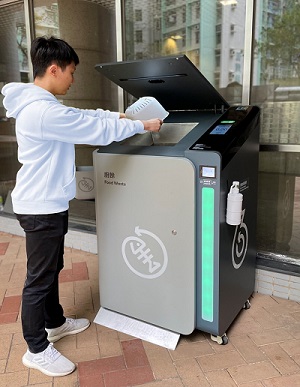
Smart recycling bins to collect food waste in buildings
Funding Support to Food Waste Collection and Recycling
Under the Community Waste Reduction Projects of the ECF, the Government supports non-profit making organisations to carry out food waste collection and recycling projects, such as setting up on-site composters for food waste treatment.
Under various project schemes of the Recycling Fund, the Government also subsidizes the recycling industry and eligible organisations to carry out food waste related projects; and supports the adoption of smart bin technology at residential buildings to collect food waste for recycling.
ECF Community Waste Reduction Project -food waste composting
Recycling Fund Project - food waste collection in housing estate using smart bin
Information on food waste-related projects with funding support
- Community Waste Reduction Project (ECF)
- Enterprise Support Programme (Recycling Fund)
- Industry Support Programme (Recycling Fund)
- Solicitation Theme: Supporting Residential Buildings in Adopting Smart Bins Technology in Food Waste Collection and Recycling (Recycling Fund)
- Pilot Scheme on Food Waste Smart Recycling Bins in Private Housing Estates (ECC)
- List of Private Residential Buildings and Transitional Housing with Smart Food Waste Recycling Bins Installed
Recycling at Facilities
The first organic resource recovery centre (O·PARK1) was opened in 2018 for turning food waste into energy/resources. In addition, the first trial scheme on the food waste/sewage sludge anaerobic co-digestion was also launched in 2019 at the Tai Po Sewage Treatment Works. To achieve the target of “Zero Landfill”, the Government will continue to develop the O·PARKs and optimize the use of sewage treatment works for carrying out food waste/sewage sludge anaerobic co-digestion to enhance the overall food waste treatment capability in Hong Kong.
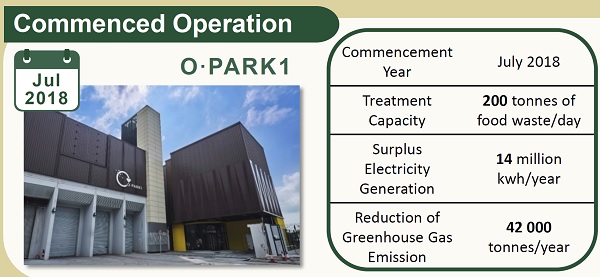
For the details of O·PARK1, please visit https://www.opark.gov.hk/en/
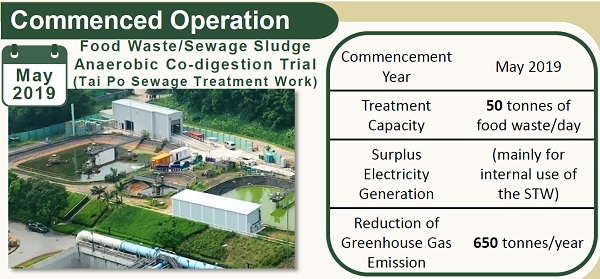
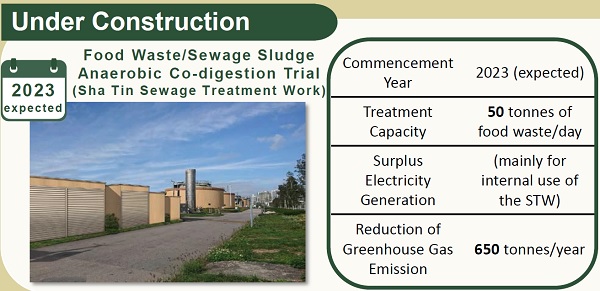
For details of Food Waste/Sewage Sludge Anaerobic Co-digestion Trial Scheme, please visit https://www.epd.gov.hk/epd/english/environmentinhk/waste/prob_solutions/codigestion_trial_scheme.html
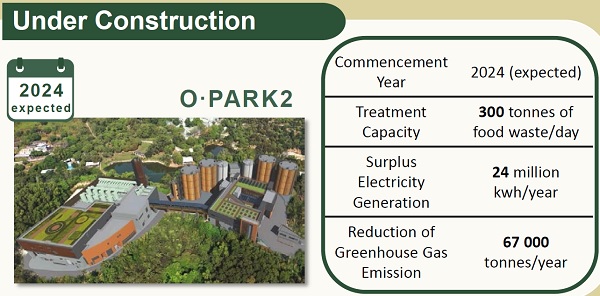
For the details of O·PARK2, please visit https://www.opark2.com.hk/
